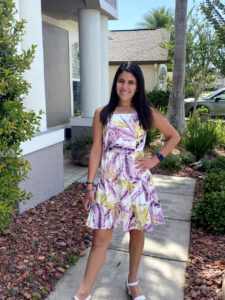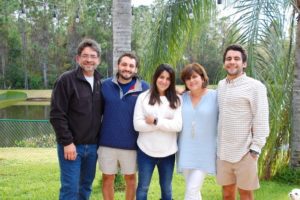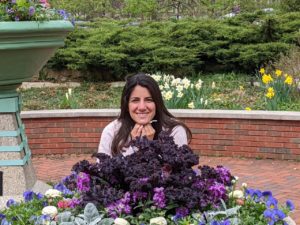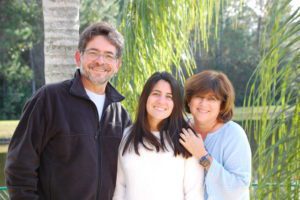In 1992, Elsa Burgos and her husband, living in Puerto Rico at the time, welcomed a new addition to their lives: their daughter Nicole. The pair were thrilled to have such a happy, beautiful child. As she grew up, Nicole met all of her milestones, developed a love for dancing, and was even Drum Major in her high school’s marching band. Then, in her 20s, things began to change. Eventually, at age 27, Nicole was diagnosed with adult-onset Niemann-Pick disease type C (NPC).
When I spoke to Elsa about her journey as a mother and an advocate, I was struck by her tenacity, strength, and determination to make a difference. Between working to ensure that her daughter has a good life and fighting for medication access for the wider NPC community, Elsa has worked tirelessly to raise awareness. She explained:
This isn’t the time to wait around. I’m trying to do my best.
Right now, it is crucial to amplify the discussion around NPC, those who are affected, and why the FDA’s denial of arimoclomol could present immense issues for patients. See how Elsa is making a change through advocacy and her “Niemann Pick C Awareness Group” on Facebook, and how other mothers are joining the fight through the “Don’t Give Up On NPC” community.
Niemann-Pick Disease type C (NPC)
To start, it’s first important to understand what Niemann-Pick disease type C (NPC), a progressive metabolic disorder, actually is. There are three forms of Niemann-Pick disease: types A, B, and C. While SMPD1 gene mutations cause types A and B, NPC is caused by either NPC1 or NPC2 mutations. In each case, the gene mutations prevent the body from metabolizing cholesterol and lipids within cells. As a result, these build up and cause cell death. NPC may affect multiple organs in the body.
In some cases, it appears in childhood. For others, such as Nicole, NPC is adult-onset; for these individuals, symptoms may appear as psychiatric even though they are neurological. Elsa explains that other symptoms of NPC include:
- Dementia
- Memory loss
- Hearing loss
- Enlarged spleen and/or liver
- Jaundice (yellowing of the skin and eyes)
- Difficulty swallowing
- Eye paralysis (in terms of vertical eye movement)
- Clumsiness
- Slurred speech
Unfortunately, NPC is fatal – whether in a few short years or over an extended period of time. There are also currently no FDA-approved treatments for patients, although arimoclomol and miglustat, (approved for Gaucher disease), have shown some promise in treating NPC. However, as you will see a little later in this article, there is a lot of controversy around FDA’s denial of arimoclomol.
To learn more about NPC, take a look at this helpful primer from the National Niemann-Pick Disease Foundation.
Nicole’s Story
When she was first born in 1992, Nicole did present with a few abnormal symptoms. For example, Elsa said:
She had an enlarged spleen, but just a little bigger than normal. And she was jaundiced. But we did a bunch of testing and nothing really showed up.
Eventually, Nicole was released from the hospital and seemed good to go. By all accounts, she had a relatively normal childhood. Her family eventually moved to Texas, where Nicole fell in love with dance. For 11 years, she participated in modern dance, hip hop, and ballet classes.
Outside of her love for dance, she also genuinely enjoyed school, even being placed in the top 10% of her high school class.

Looking back now, Elsa wonders if Nicole had shown any NPC-related symptoms during high school. She recounts how, after Nicole was diagnosed, she actually called some of the old high school teachers to ask if they had noticed anything. Elsa laughed as she told me:
One teacher said that they remembered she was clumsy. But I figured that she just got that from me.
Following high school, Nicole wanted to pursue her dream job: being a doctor. This dream took her to Texas A&M University, where Nicole was accepted as a biochemistry major.
Educational Journey
Within her first semester at college, Nicole seemed to be struggling. In fact, she was even placed on academic probation. As someone who had done so well in high school, this change seemed stark, concerning. Elsa said:
She was never a partier, so we weren’t sure why she was having trouble.
Eventually, Nicole switched schools, attending community college, and pursuing a nursing degree. Again, she began to struggle. Nicole moved to Orlando in 2015; Elsa and her husband to Tampa one year later. At this point, said Elsa:
Her speech was a little slow. Even though she seemed kind of fine, I noticed how slow she was speaking. We ended up calling a neurologist and asking him to run some tests, like MRIs and EEGs. Everything came back negative, so I thought that I must have been overthinking.
Admittedly, things did seem to be on the upswing. Nicole was able to finish her degree at the University of Florida.

Soon, she began working as a patient care tech in an intensive care burn unit, a testament to what Elsa told me throughout the interview:
She really is the sweetest girl you’ll ever meet. She cares so deeply about everyone around her.
The Diagnostic Journey
However, by the summer of 2019, things seemed to be changing again. On a family hike, Nicole struggled to keep up:
She couldn’t seem to scan the trail and kept running into trees.
Around that time, Elsa also noticed that she seemed much younger from a maturity standpoint. I explained a little earlier that for adult-onset NPC, many people often present with symptoms that may seem psychiatric in nature, but are actually neurological. Nicole’s experience is a clear example of this. In August 2019, Nicole presented with signs of psychosis:
She kept saying she was God, she was going to save the world. I thought it was just stress, but knew that I had to take action when she asked me if I would be okay if it was her last day on Earth.
When her family took her to the hospital, Nicole was diagnosed with bipolar disorder and placed in a mental health facility for 11 days. Upon release, she was initially not given medication or a treatment plan. Elsa and her husband advocated for their daughter, who was later treated for bipolar. But to Elsa, something still seemed off:
When I was told bipolar, I did all of this reading and was like, ‘That doesn’t sound like Nicole.’ I was reading and we don’t have it in the family. I thought it was something neurological from the beginning, maybe a brain tumor, but was never expecting NPC.
As expected, the bipolar medication did not really help and Nicole was later placed in another mental health facility for 11 days. But the nurses there agreed – the symptoms didn’t seem psychiatric, but neurological. The symptoms worsened: hallucinations, loss of speech, and a catatonic state. Doctors thought that it might be schizophrenia. She was then transferred to Tampa General Hospital, where Nicole had two lumbar punctures, EEGs, MRIs, and more – but still, the diagnosis was just out of reach. Doctors thought she might have NMDA Encephalitis.
Diagnosing NPC
Finally, in November 2019, Nicole was transferred to the Mayo Clinic in Florida where she underwent rapid genetic testing. Elsa stated:
At this point, we knew it was something super rare or something that would have her name on it. Rapid genetic testing took 2 weeks, but we needed it. We couldn’t wait six more months.
Then, on December 5, at age 27, the family finally received a diagnosis: Niemann-Pick disease type C. When asked how she felt about the diagnostic process, especially as it can be so long to receive a rare disease diagnosis, Elsa said:
Compared to other patients, her diagnosis was actually pretty fast. For others it takes 10 years. Plus, when she got diagnosed, at least I finally had a name for the disease. It didn’t give me peace, but it gave me a jumping off point. I knew what we were dealing with.
When Nicole returned home from the hospital, her family was faced with a new reality. Elsa took the role of caregiver, helping her daughter to eat and bathe, taking Nicole to occupational therapy. The pair began doing virtual yoga 3x each week and even walking up to 3 miles every morning.
Then, in October 2020, Nicole and her family received an extremely beneficial medication: arimoclomol.
Arimoclomol
Developed by CytRx Corporation and later sold to Orphazyme, arimoclomol is an investigational heat shock protein amplifier. According to MPR, this drug candidate can:
rescue defective misfolded proteins, clear protein aggregates, and improve the function of lysosomes.
As MPR also explains in that article, Orphazyme published promising data on arimoclomol earlier this year in 2021. The data showed that arimoclomol was relatively safe and well-tolerated, and helped prevent NPC progression.

Elsa had seen this benefit in Nicole when her daughter began taking arimoclomol 3x daily, alongside an off-label drug, in October 2020. In fact, others also saw the positive change:
I didn’t tell anyone that she started taking arimoclomol. But in December, people were telling me that she was doing better. Her roommate from college says she sounds like Nicole again.
Arimoclomol has helped her tremendously. She walks, eats on her own, swims, and more. The drug does not completely stop NPC progression. Elsa acknowledged that Nicole does still have some dementia, but:
if she stays like this, I’ll take it.
A Blow to the NPC Community
Unfortunately, the FDA delivered a blow to the NPC community in 2021. In January 2021, Clinical Trials Arena stated that an FDA approval was probable. Most families expected approval on June 17, 2021. However, this approval did not happen. On June 18, 2021, Orphazyme released a statement sharing that the FDA had denied the approval:
based on needing additional qualitative and quantitative evidence…[and] additional data…to bolster confirmatory evidence beyond the single phase ⅔ clinical trial.
While Orphazyme admitted that the company was disheartened by the results, imagine how those touched by NPC feel. For many, waiting for the FDA to proceed with another double-blind trial is daunting and frightening. Elsa’s husband and Nicole both actually spoke to the FDA about these concerns during a listening session. Will those in the placebo group progress further? Is delaying the treatment taking away time from families? One question that Elsa hears often from other parents is, “What is going to happen to our kids?”
A Shared Fight
To Elsa, the fight for arimoclomol approval isn’t just personal; it’s communal. She shared:
This is life or death for these kids. My daughter has a pretty normal life. She doesn’t work, doesn’t drive, but we can go to the movies, we can go to the beach. If they take this away, she’ll be in a wheelchair in a year. And this isn’t the only story. There are a lot of beautiful stories about kids who are doing great with these therapies. We need to unify and fight for them.
This is life or death. The statement sits, heavy as a stone. But it is true, and immensely difficult to comprehend. What will happen to Nicole? To 10-year-old Vivi, whose petition shares how much her medication had helped her?
Perhaps the hardest part of the interview was when Elsa and I were talking about what happens next. She said:
I get a shipment on Thursday and look forward to having another month of medication. In October, I don’t knowif I’m going to get another month. We were lucky enough that Nicole didn’t have any symptoms until adulthood. We’ve enjoyed her for a long time, but we don’t know how long we have left.
For Elsa and her family, and for the many other families affected, they face a very real and present balance of life and death each and every day. It is time to raise our voices and work to create a better future for these patients through research and treatment advancements.

Creating Community
To provide an outlet for families, and a platform to begin the fight, Elsa created the “Niemann Pick C Awareness Group” on Facebook. Currently, there are over 1,100 members in the group; that’s 1,100 people who are looking to make a difference, share stories, and connect. Finding a supportive community really helps to grapple with a new diagnosis and, since offering support is one of the best ways to help, this group really fulfills that need.
When asked why she created this group, Elsa stated:
I wanted to create a community but also raise awareness. There are a lot of undiagnosed people, people diagnosed as bipolar or another condition, or people in institutions who actually have NPC. I want people to know what this is in case you see it; if you’re a teacher who sees these, I want them to notice it. I want people to identify the symptoms. The faster it gets diagnosed, the better quality of life.
Increased identification is incredibly important, especially for those with a rare disease like NPC. Elsa, and many other families, often find it their duty to inform some doctors, as for most, their experience with NPC is limited to a paragraph or two in med school.
Beyond the Facebook group, Elsa also works to provide support and resources to newly diagnosed families. Recently, she shared:
My doctor connected me with a newly diagnosed family in Tampa, who received their diagnosis Tuesday. I provided a paper with all of the doctors and foundations, possible experimental treatments, and information on the Mayo Clinic Rochester and Rush University Medical Center which has the best 2 doctors for NPC in the United States.
Finally, Elsa and many other families find comfort in the “Don’t Give Up On NPC” Facebook group. While she did not create this group, she is a member; 5,203 followers are currently in the group, each day sharing their own stories and experiences.
How Can You Help?
Moving forward, the fight for NPC research and treatments is on the horizon. The entire NPC community is going through a frightening time, with both potential treatments currently halted by the FDA.
So how can you help? Yes, you can help even if you or those around you don’t have NPC. Here’s how:
- Join the Niemann Pick C Awareness Group and Don’t Give Up On NPC Facebook groups to hear from those directly affected. Read and share those stories.
- Sign petitions to the FDA, such as this one from Vivi and this petition from NPC Mamas.
- Donate to the Ara Parseghian Research Foundation to help support NPC research.
- Use the hashtags #dontgiveuponnpc and #saveourmedicines on social media to increase awareness.
- Email or write a letter to the FDA. See how to take these actions here. You can also write a letter to your representatives or senators.


